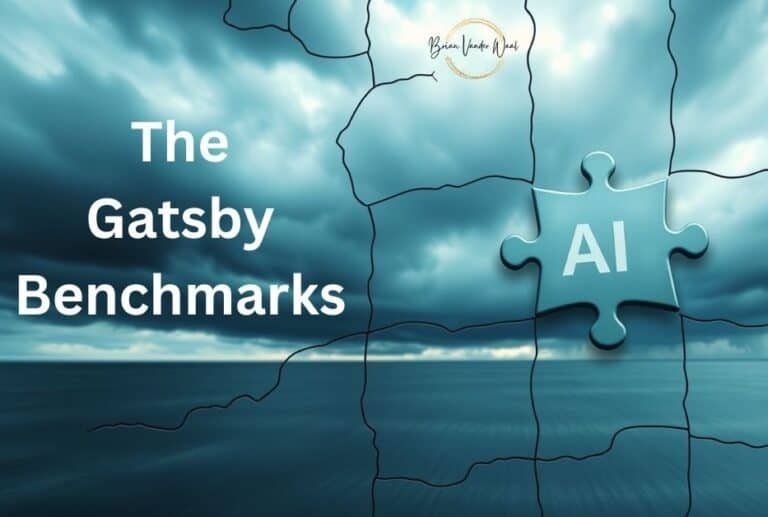Disclosure: brianvanderwaal.com is supported by our users. Some of the links in this article may be affiliate links, which can compensate me at no cost to you if you decide to make a purchase.
In the battle of Coursera vs Udemy, which is better? This is a question that many people have asked me. So I have written this blog to answer this question, based on more than 19 years of experience giving information, advice and guidance on education and training.
There are a huge variety of massive open online course (MOOC) platforms in the education space; one of the most popular is Udemy. Coursera, on the other hand, is an online education platform that has caught the attention of many leading universities in the US, UK, and around the world.
Coursera is a distance-learning platform that offers online courses for a professional certificate, diploma, or degree program.
Udemy is a similar service but with a focus on online video courses that are taught by industry experts, where you can often learn a professional skill. Plus, Udemy has courses for self-paced learning if you prefer to learn on your own time and your own schedule.
Coursera and Udemy both offer a wide variety of courses, but which is the best online course provider for you? To help you decide which online education platform is best for you, I put the two online course platforms head-to-head and analyse the offerings of each company. I will compare, contrast, and review Coursera and Udemy in this blog post.
Key Takeaways
- Coursera and Udemy are leading online learning platforms with distinct approaches. Coursera partners with universities for accredited education, while Udemy offers a broader marketplace with courses from individual instructors.
- Coursera excels in quality and credibility with university-backed courses, verified certificates, and accreditation from organisations like the American Council on Education – making it better for academic advancement and CV/resume-building.
- Udemy wins on affordability and variety with over 250,000 courses (compared to Coursera’s 10,000+) at generally lower price points.
- For free learning, Coursera offers superior options with more free courses (18x more than Udemy) and the unique ability to audit many courses without paying.
- Coursera offers more structured learning paths including guided projects (1-2 hours), standard courses (4-12 hours), specialisations (1-3 months), professional certificates, MasterTrack certificates, and even complete degree programs.
- Udemy’s open instructor model means anyone can create and sell courses. This leads to incredible variety but also inconsistent quality that requires you to carefully check reviews before purchasing.
- Both platforms offer subscription options (Coursera Plus at $59/month or $399/year vs Udemy Personal Plan at $20/month) with Coursera covering more comprehensive content but at a higher price point.
- Choose Coursera if you need recognised certificates, university-level education, or structured learning paths toward career advancement or academic goals.
- Choose Udemy if you want affordable skill-building, hobby exploration, or access to the broadest possible range of topics with flexible, self-paced learning.
- The best option ultimately depends on your personal goals, budget constraints, and whether recognition/accreditation matters for your learning journey.
Table of Contents
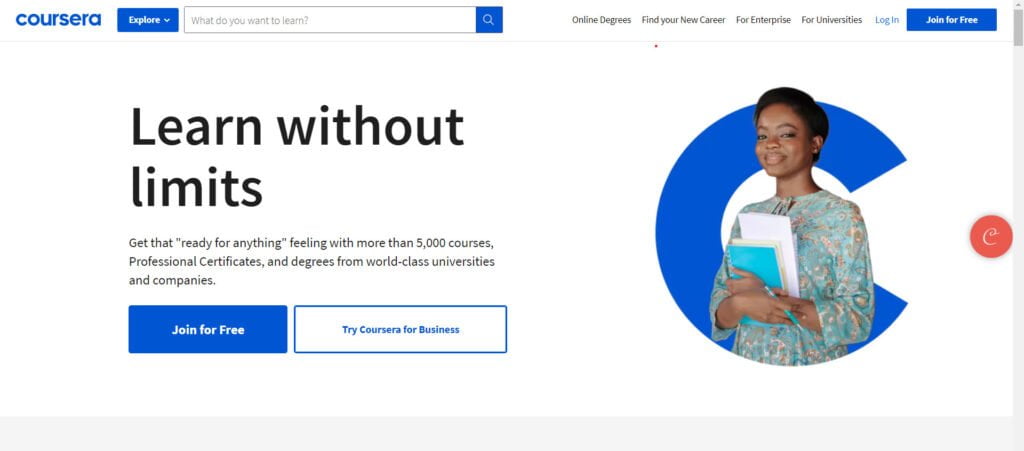
VS
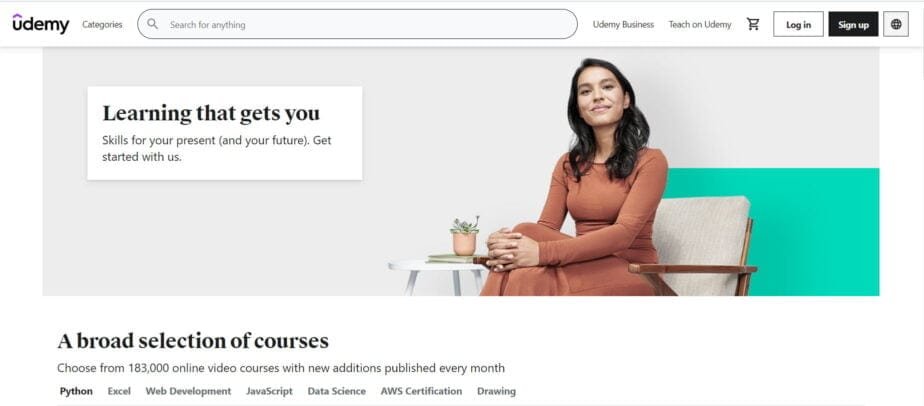
Coursera vs Udemy: A Brief Overview
Coursera and Udemy are two of the most popular online learning platforms. Coursera was founded in 2012 by Andrew Ng and Daphne Koller, two computer science professors at Stanford University. Udemy was founded in 2010 by Eren Bali, Oktay Caglar, and Gagan Biyani. Both Coursera and Udemy offer a wide variety of online courses from a number of different providers.
However, there are some key differences between the two platforms.
- Coursera is focused on offering university-level courses and degrees that are accredited by universities, while Udemy is focused more on vocational courses and shorter courses. However, Udemy offers some university-level courses.
- Coursera courses are typically longer and more comprehensive than those on Udemy.
- Courses on Udemy are generally cheaper than those on Coursera.
- There are more courses available on Udemy than on Coursera
- Coursera offers a number of features that Udemy does not, such as the ability to audit courses for free and the option to receive a verified course certificate upon completion of a course.
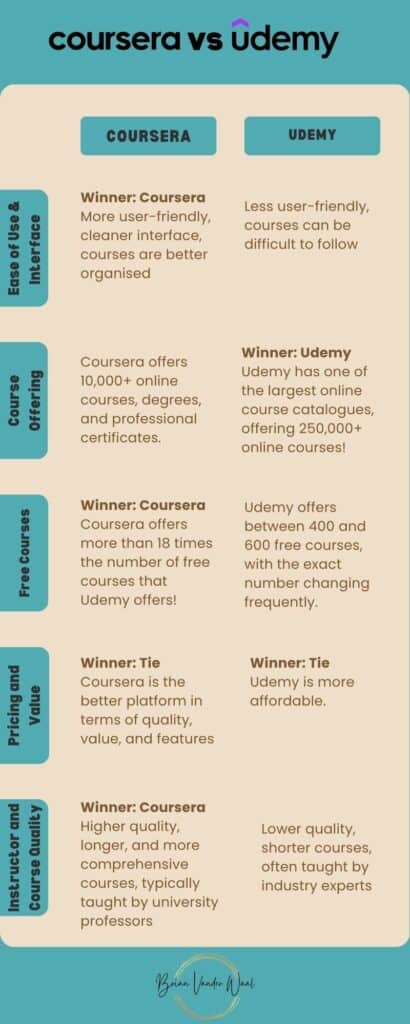
Coursera vs Udemy Course Offering
Coursera offers a wide variety of courses from different providers. For example, you can take courses on Coursera from Harvard, Stanford, the University of Pennsylvania, and more.
Coursera offers an immense amount of options, which include:
- Guided Projects – Choose this to quickly learn job skills and industry tools. The average time commitment for a Guided Project is 1-2 hours.
- Courses: Choose this to gain new knowledge. The average time commitment for a Coursera course is 4-12 hours.
- Specializations – Choose this to master a specific skill. The average time commitment is 1-3 months.
- Professional Certificates – Choose this to get job-ready for an in-demand career. The average time commitment is 1-6 months.
- MasterTrack Certificates – Choose this to earn a university-issued certificate and credit towards a degree. The average time commitment is 4-7 months.
- Degrees – Choose this to earn your bachelor’s or master’s degree. The average time commitment is 2-4 years.
- Coursera Plus – Choose this to get unlimited access to 10,000+ courses, hands-on projects, and job-ready certificate programs.

Coursera offers courses in AI, Data Science, Business, Computer Science, Health, Social Sciences, Personal Development, Arts, Humanities, Physical Science, Engineering, Language Learning, Information Technology, Machine Learning, Math, and Logic.
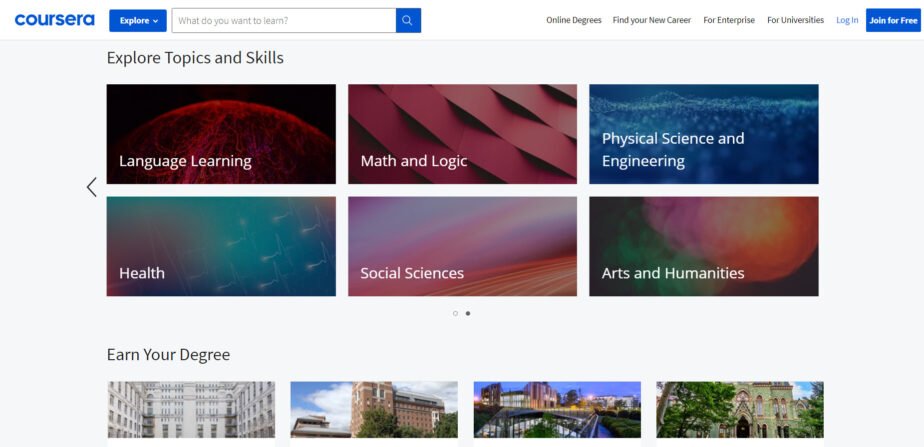
Some popular Coursera courses include:
- Microsoft AI Product Manager Certificate (and many other career-building Microsoft courses)
- Introduction to Psychology from Yale (and many other career-building Yale courses)
- Google Data Analytics Professional Certificate (and many other career-building Google courses)
- MSc in Machine Learning and Data Science from Imperial College London (and many other career-building Imperial College London courses)
- IBM Python for Data Science, AI & Development (and many other career-building IBM courses)
- AI in Healthcare Specialization from Stanford University (and many other career-building Stanford University courses)
- Career-focused credentials and courses to advance your career from 350+ leading universities and companies, including Meta, Duke University, AWS, University of Pennsylvania (Penn), Adobe, University of Illinois, Amazon and many more!
Udemy also offers a wide variety of courses; however, most of their classes are designed by individual instructors.
Udemy has one of the largest online course catalogues, offering over 250,000 online courses! You can find courses in almost every subject area and niche and learn a variety of specific skills. They have a huge catalogue of quality business courses. High-quality trailers are provided to help to assess if an individual course is right for your needs.

One of the biggest differences between Udemy and Coursera is that, unlike Coursera, they do not rely on partnerships with universities and companies to provide their material. As a result, almost anyone can put together an online course to teach on Udemy and they can teach on almost any topic.
Another difference is that Udemy does not tend to offer courses that count towards a university degree. However, some of their courses may count towards a skilled trade certification.
Udemy offers courses in business, marketing, design, development, IT, programming, machine learning, software, tech, teaching, productivity, language, music, arts, photography, health, lifestyle, hobbies, and much more.
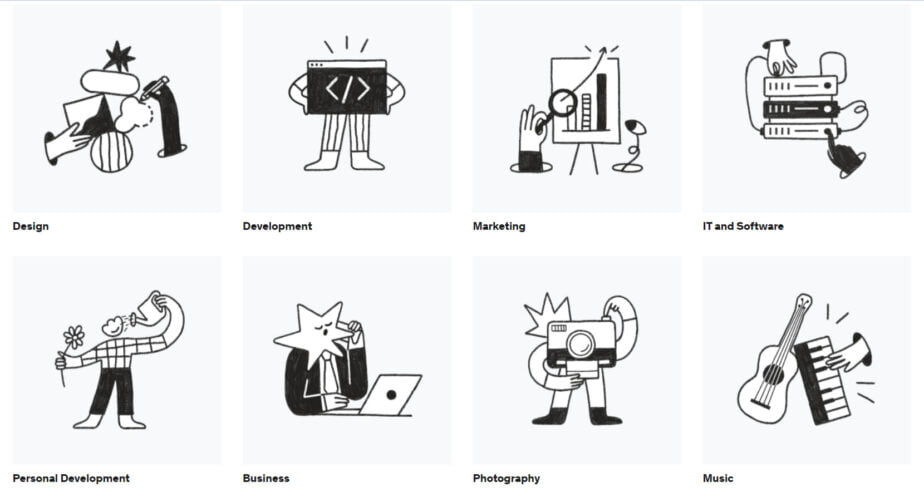
Some popular Udemy courses include:
- The Complete Digital Marketing Course – 12 Courses in 1
Coursera vs Udemy Free Courses
Looking for a free course? Udemy may be especially appealing to you if you are on a budget because they have a substantial number of free courses. The good news is that many of their free courses are taught by experts, professors, entrepreneurs, and professionals. Udemy further allows students to preview classes they are interested in and offers a 30-day money-back guarantee.
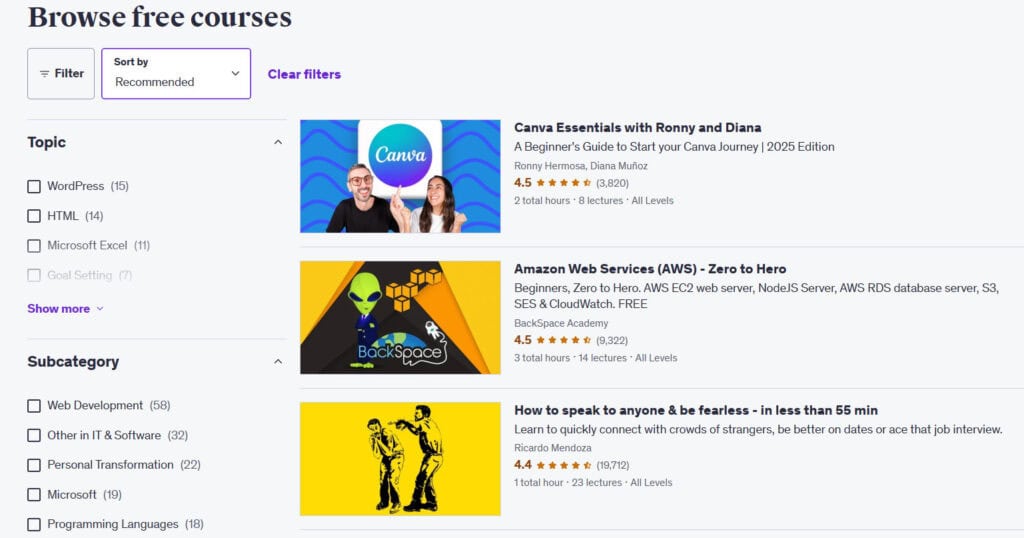
However, if you are looking for a free course, you have a better chance and more choices with Coursera. At the time of writing Coursera offers more than 18 times the number of free courses that Udemy offers. Further, Coursera offers the option to audit courses for free; whereas, Udemy does not.
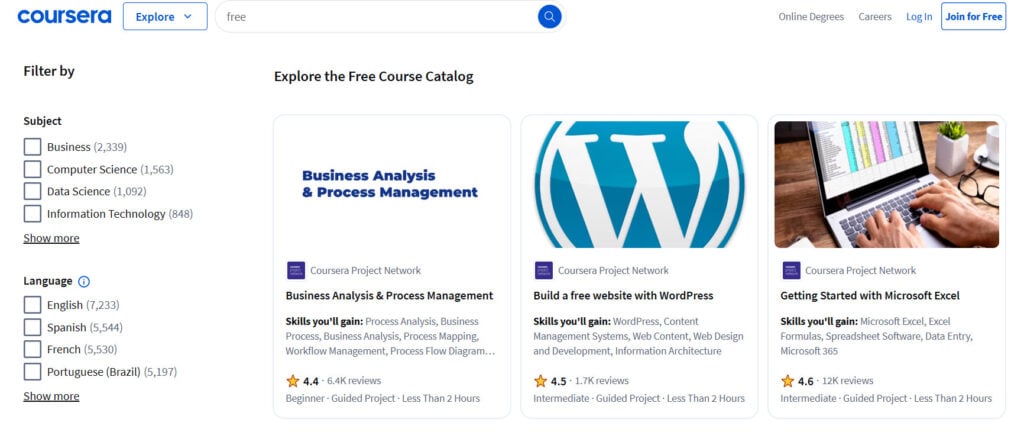
Coursera vs Udemy Pricing & Value
Both individual courses and personal plans on Udemy are generally cheaper than those on Coursera.
Udemy Individual Course Prices
Udemy courses cost from $9-$300+ for an individual course, but a typical Udemy course costs between $19 and $59. Udemy also regularly offers discounts and coupons for Udemy courses; sometimes significant discounts. It is not uncommon to see higher-priced courses discounted to £10.99, £12.99, or £15.99. On the other hand, Udemy does not offer a clear pricing structure.
Coursera Individual Course Prices
A typical Coursera course costs between $29 and $99 for a single course (higher than a typical Udemy course), and due to the nature of the courses they offer, some cost much more. Naturally, degrees and courses providing professional certificates or credits toward a degree will cost significantly more. Coursera’s pricing structure is also a bit clearer. Below is an outline of Coursera’s price structure:
- Guided Projects – The cost starts at $9.99.
- Courses: The cost starts from free.
- Specializations – The cost starts at $49 per month.
- Professional Certificates – The cost starts at $49 per month.
- MasterTrack Certificates – The cost starts at $2,000.
- Degrees – The cost starts at $9,000.
However, Coursera offers discounts and coupons for Coursera courses regularly. For example, Coursera often runs sales where you can get Coursera courses for 50% off.
Udemy Personal and Team Plans
Udemy’s Personal Plan
- $20.00 / £15.00 per month
- Access to 12,000+ top courses
- Certification prep
- Goal-focused recommendations
- AI-powered coding exercises
Udemy’s Team Plan
- $30.00 / £23.00 per month
- Access to 12,000+ top courses
- Certification prep
- Goal-focused recommendations
- AI-powered coding exercises
- Analytics and adoption reports
Coursera Personal and Team Plans
Coursera’s Personal Plan costs:
- $399 / £312 per year (equivalent to $33.25 / £26 per month) on the annual plan
- $59.00 / £46.00 per month on the monthly plan
Coursera’s Personal Plan provides:
- Access 10,000+ courses and Specializations from 350+ leading companies and universities
- Earn unlimited certificates after your trial ends
- Learn job-relevant skills and tools with 1,000+ applied projects and hands-on labs from industry experts
- Choose from more than 15 Professional Certificate programs from industry leaders like Google, Facebook, and more
Coursera’s Team Plan
- $399/year (equivalent to $33.25 per month)
- Unlimited access to 8,500 learning opportunities
- The opportunity to upskill 5 to 125 employees
- Program setup and launch tools
- Analytics and benchmarking dashboard
Coursera vs Udemy Value
When it comes to value, Coursera is the clear winner. This is because Coursera offers several features that Udemy does not, such as the ability to audit courses for free and the option to receive a verified certificate upon completing a course. Coursera also offers financial aid for those who cannot afford to pay for a Coursera course.
Overall, if you are looking for a high-quality course that provides value for money and is often free, Coursera is the better option. If you are looking for more affordable courses, Udemy is the better platform.
Coursera vs Udemy Quality of Courses, Instructor Quality & Experience
Coursera Vs Udemy Course Quality
In terms of course quality, Coursera courses are generally superior to those on Udemy. This is because Coursera courses are accredited, and are typically longer and more comprehensive than those on Udemy.
They are also offered by accredited universities and top companies (including Fortune 500 companies). However, this is not to say that all Coursera courses are of higher quality. There are some Coursera courses that are not as comprehensive or well-organised as those on Udemy.
Coursera Vs Udemy Instructor Quality and Experience
In terms of instructor quality and experience, Coursera courses are often better than those on Udemy. University professors usually teach Coursera courses, while Udemy courses are often taught by an instructor who is an industry expert. Additionally, some of the instructors on Coursera have more experience than those on Udemy.
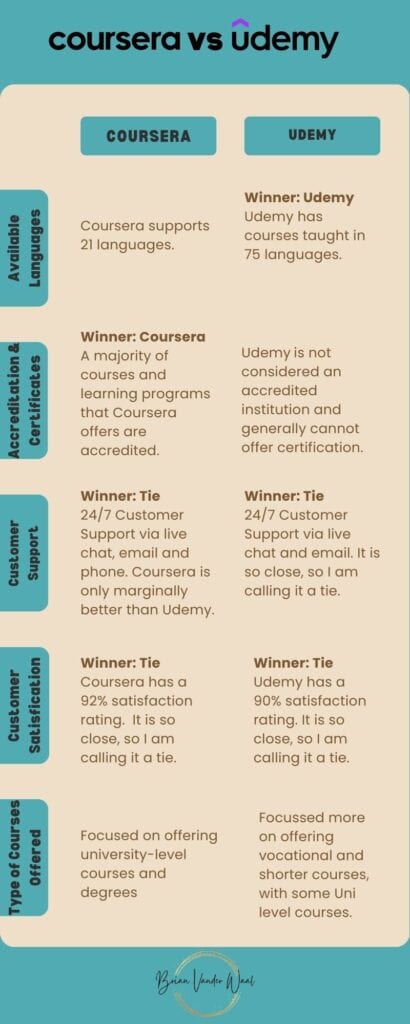
Coursera vs Udemy Available Languages
Udemy has over 80,000 instructors, with courses taught in seventy-five languages.
Coursera supports twenty-one languages, including Arabic, Chinese (China), Dutch, French, German, Greek, Hindi, Hungarian, Indonesian, Italian, Japanese, Kazakh, Korean, Polish, Portuguese (Brazil), Russian, Spanish, Swedish, Thai, Turkish and Ukrainian. Most of the video lessons have an interactive transcript, which is also available to students on the mobile app.
Coursera vs Udemy Accreditation & Certificates
Coursera is accredited by several organisations, including the American Council on Education, whereas Udemy is not. Coursera also offers the option to receive a verified Coursera certificate upon completion of a course, while Udemy does not.
A majority of courses and learning programs that Coursera offers are accredited. Udemy is not considered an accredited institution, so courses will not count toward college credit or continuing education units (CEUs).
As a result, having Coursera courses on your resume or CV will often look better than having Udemy courses.
Coursera vs Udemy Ease of Use & Interface
In terms of ease of use and interface, Coursera is slightly more user-friendly than Udemy. Coursera offers a cleaner and more organised interface than Udemy. Additionally, Coursera courses are typically better organised and easier to follow than those on Udemy. However, this is not to say that Udemy is difficult to use; it is just not as intuitive as Coursera.
Coursera has a more sophisticated backend and design than Udemy. Coursera uses a number of different tools to create its courses, including video lectures, readings, and quizzes. Udemy, on the other hand, relies primarily on video lectures.
Coursera vs Udemy Customer Support & Satisfaction
Both Coursera and Udemy offer excellent customer support. Coursera offers 24/7 customer support via live chat, email, and phone. Udemy also offers 24/7 customer support via live chat and email.
In terms of satisfaction, Coursera has a 92% satisfaction rating, while Udemy has a 90% satisfaction rating.
Reviewing Coursera and Udemy
Now that we have compared Coursera and Udemy, it is time to review each platform.
Coursera Review
Coursera has a lot to offer users. Coursera is an accredited institution with 175 million learners around the world. They work in partnership with over 350 top universities (e.g., Princeton University, Imperial College London, Yale, Duke, etc.) and companies (including Fortune 500 companies) to offer university courses, certificate programs, free content videos, and other course offerings to help you achieve your goals. It is even possible to completely achieve certifications, degrees, and other recognised credentials through Coursera.
The platform is easy to use and navigate. Courses are typically well-organised and comprehensive. Courses on Coursera are generally more expensive than those on Udemy; however, this is to be expected given the difference in focus between the two platforms. Overall, Coursera is an excellent choice for those looking for university-level courses.
What I like about Coursera:
- User-friendly website
- The content and course material is well organised
- Achieve an accredited course certificate recognised by employers
- More than 8,638 free courses
- More than 10,000 online learning courses, Professional Certificates, and degrees covering an extensive range of topics
- 100% online degrees
- Classes available in multiple languages
What I dislike about Coursera:
- Coursera has a short trial period
- The price of a course certificate for each course could be more transparent
- Strict timelines on some courses
- Degree programs that are offered through Coursera require additional applications.
Udemy Review
Udemy is also a great platform with a lot to offer users. The sheer number of courses available on Udemy is impressive. They offer significantly more courses than Coursera and most other online learning platforms, with over 250,000 online courses available and new additions published monthly. If you want to learn something, you will likely find it on Udemy.
Udemy has over 80,000 instructors, with courses taught in 75 languages, so you will find an online course in almost every subject area and niche.
They have had more than 77 million student learners and over 1 billion course enrollments. With those numbers, you can be confident they are doing something right. They also have more than 17,000 enterprise customers.
In addition, courses on Udemy are generally less expensive than those on Coursera. It should be noted, though, that many of these courses are of questionable quality, so you need to read the reviews. Overall, Udemy is an excellent choice for those looking for vocational and shorter courses.
What I like about Udemy:
- Udemy has one of the largest online course catalogues, offering more than 250,000 online courses!
- You can find courses in almost every subject area and niche and learn a variety of specific skills.
- A huge catalogue of quality business courses.
- High-quality trailers are provided to help to assess if an individual course is right for your needs.
- Multimedia lectures are offered, which often incorporate readings and quizzes.
- There is a 30-day money-back guarantee
What I dislike about Udemy:
- Udemy’s plans can be quite frustrating
- Some courses need to be purchased individually and may not be included in a monthly subscription
- There are limited support options
- Short free trial period
- Udemy is not an accredited institution
- Udemy’s “Certificate of Completion,” is not accredited
- Anyone can create an online course on Udemy. There is no formal approval process needed to become a Udemy Instructor. As a result, some courses are not high quality.
Conclusion: The Bottom Line on Coursera vs Udemy 2026
Coursera and Udemy are both excellent platforms with a lot to offer users. Coursera is the better platform for those looking for university-level courses. Udemy is the better platform for those looking for vocational courses or shorter courses.
Ultimately, the best platform for you is the one that meets your needs and preferences!
Do you have any experience with Coursera or Udemy? Let us know in the comments below!
Frequently Asked Questions (FAQs) – Coursera vs Udemy
What is a massive open online course (MOOC)?
A massive open online course (MOOC) is an online course that welcomes anyone to participate and access it remotely via the Web without restrictions. They generally offer conventional course materials such as video lectures, written assignments, readings, case studies, and problem sets.
However, many MOOCs also offer student forums or social media discussions to aid student-teacher communication, connections among students, and prompt feedback for quizzes and assignments.
MOOCs were established for the first time in 2008 and have grown in popularity since 2012 due to their capacity to be studied remotely.
What is Coursera?
Coursera is an online learning platform that offers university-level courses and degrees from leading universities and companies from around the world. They offer courses and degrees to all people, no matter where they are in the globe. A majority of the courses are free to take.
Many of the courses on Coursera involve watching lectures and presentations through video streaming, doing readings, having discussions with other students, completing assignments, and carrying out quizzes.
Following Coursera’s B Corp certification in February 2021, they now have a commitment to make a positive impact on society, in addition to their legal duty to their shareholders. They aim to make a positive impact on society by continuing their endeavours to reduce barriers to high-quality education for all. (Source: Coursera)
What is Udemy
Udemy is an online learning platform for learners seeking professional skill courses, vocational courses, and some university-level courses. It is also a platform for teachers who want to market a course. In other words, Udemy practices a marketplace business model.
Udemy currently has over 250,000 courses and 77 million students. Udemy doesn’t actually own the courses; rather, it is a mediator for the courses and categorises them on its website.
Is Coursera or Udemy better?
The answer to this question depends on your needs and preferences. If you are looking for university-level courses, Coursera is the better choice. If you are looking for vocational or professional skill courses, Udemy is the better choice.
If you are seeking the most affordable option, Udemy is often the better choice. However, if you are looking for value for money, Coursera is often the better choice. Ultimately, the best platform for you is the one that meets your needs and preferences. To learn more, read my blog above.
What other Udemy and Coursera competitors and alternatives are there?
Other Udemy and Coursera competitors and alternatives include Edx, Udacity, MasterClass, Pluralsight, Skillshare, LinkedIn Learning, FutureLearn, Khan Academy, and more.
Is Coursera or Udemy more expensive?
Courses on Coursera are generally more expensive than those on Udemy. However, this is to be expected, given the difference in focus between the two platforms.
Coursera is more focused on offering university-level courses and degrees. On the other hand, you have the option to audit most of Coursera’s courses for free.
Does Coursera or Udemy have more courses?
Udemy. They have more than 250,000 courses, whereas Coursera has only 10,000+ courses.
The sheer number of courses that Udemy offers is impressive. However, it should be noted that some of these courses are of questionable quality.
What is the difference between Coursera and Udemy?
The main difference between Coursera and Udemy is their focus. Coursera focuses on university-level courses, while Udemy focuses more on vocational and professional skill courses. However, Udemy does offer some university-level courses.
Coursera focuses more on academic topics and courses from top companies from around the world. In contrast, Udemy offers a very large range of courses within almost every niche and subject area you could think of.
Anyone can teach Udemy courses, and they tend to be cheaper and require less time commitment. However, they don’t offer the depth, accreditation, and tutor experience that Coursera does.
Udemy practices a marketplace business model, whereas Coursera retains more control over its courses and ensures the quality of its courses.
Is there anything better than Coursera?
The answer to this question depends on your needs and preferences. There are various other Coursera competitors and alternatives that are worth considering, including Edx, Udacity, MasterClass, Pluralsight, Skillshare, LinkedIn Learning, FutureLearn, Khan Academy, and more.
Is Coursera or Udemy accredited?
Coursera is accredited by a number of different organisations, including the American Council on Education, while Udemy is not. Coursera also offers the option to receive a verified Coursera certificate upon completion of a course, while Udemy does not.
A majority of courses and learning programs that Coursera offers are accredited. Udemy is not an accredited institution, so courses will not count toward college credit or continuing education units (CEUs).


